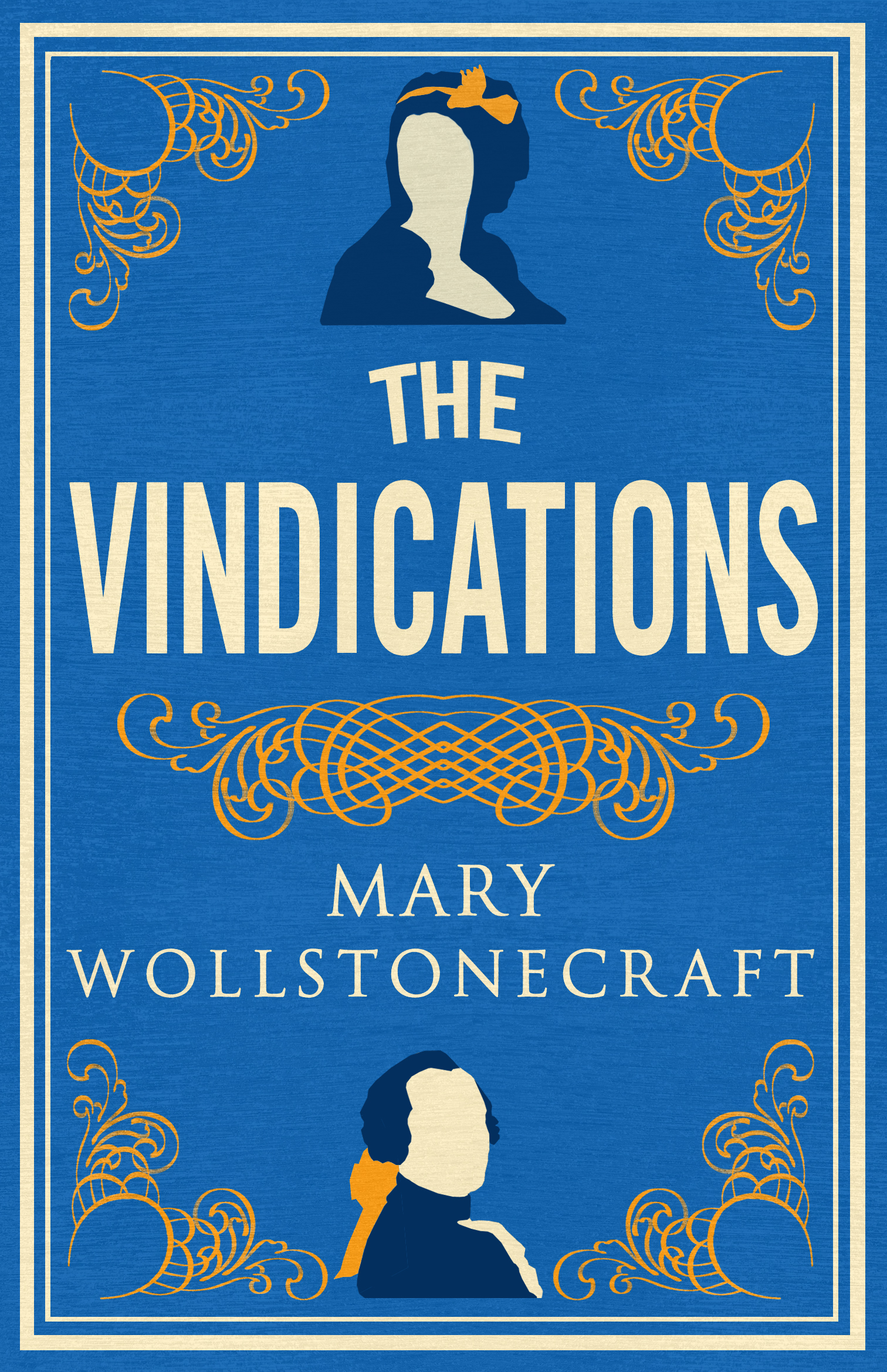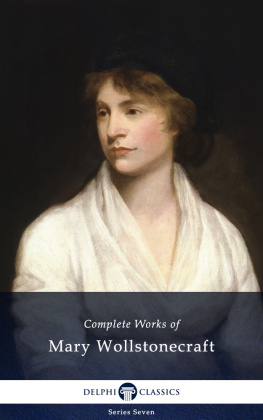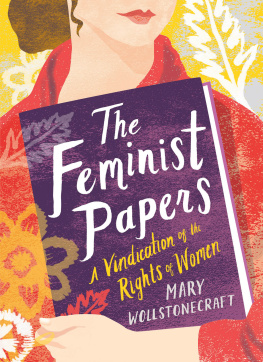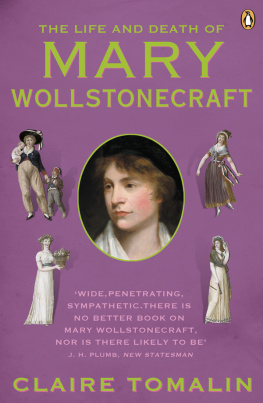Mary Wollstonecraft - The Vindications
Here you can read online Mary Wollstonecraft - The Vindications full text of the book (entire story) in english for free. Download pdf and epub, get meaning, cover and reviews about this ebook. year: 2020, publisher: Alma Books, genre: Science. Description of the work, (preface) as well as reviews are available. Best literature library LitArk.com created for fans of good reading and offers a wide selection of genres:
Romance novel
Science fiction
Adventure
Detective
Science
History
Home and family
Prose
Art
Politics
Computer
Non-fiction
Religion
Business
Children
Humor
Choose a favorite category and find really read worthwhile books. Enjoy immersion in the world of imagination, feel the emotions of the characters or learn something new for yourself, make an fascinating discovery.

- Book:The Vindications
- Author:
- Publisher:Alma Books
- Genre:
- Year:2020
- Rating:5 / 5
- Favourites:Add to favourites
- Your mark:
- 100
- 1
- 2
- 3
- 4
- 5
The Vindications: summary, description and annotation
We offer to read an annotation, description, summary or preface (depends on what the author of the book "The Vindications" wrote himself). If you haven't found the necessary information about the book — write in the comments, we will try to find it.
The Vindications — read online for free the complete book (whole text) full work
Below is the text of the book, divided by pages. System saving the place of the last page read, allows you to conveniently read the book "The Vindications" online for free, without having to search again every time where you left off. Put a bookmark, and you can go to the page where you finished reading at any time.
Font size:
Interval:
Bookmark:

The Vindications
A Vindication of the
Rights of Men
and
A Vindication of the
Rights of Woman
Mary Wollstonecraft

ALMA CLASSICS
Alma Classics
an imprint of
alma books ltd
Castle Yard
Richmond
Surrey TW10 6TF
United Kingdom
A Vindication of the Rights of Men first published in 1790
A Vindication of the Rights of Woman first published in 1792
This edition first published by Alma Classics in 2020
Cover design by Will Dady
Extra Material Alma Books Ltd
Printed in Great Britain by CPI Group (UK) Ltd, Croydon CR0 4YY
_page.png)
isbn : 978-1-84749-812-0
All rights reserved. No part of this publication may be reproduced, stored in or introduced into a retrieval system, or transmitted, in any form or by any means (electronic, mechanical, photocopying, recording or otherwise), without the prior written permission of the publisher. This book is sold subject to the condition that it shall not be resold, lent, hired out or otherwise circulated without the express prior consent of the publisher.
Contents
The Vindications
A Vindication of the Rights of Men
Advertisement
M r Burkes reflections on the French Revolution first engaged my attention as the transient topic of the day, and reading it more for amusement than information, my indignation was roused by the sophistical arguments that every moment crossed me in the questionable shape of natural feelings and common sense.
Many pages of the following letter were the effusions of the moment, but, swelling imperceptibly to a considerable size, the idea was suggested of publishing a short vindication of the rights of men.
Not having leisure or patience to follow this desultory writer through all the devious tracks in which his fancy has started fresh game, I have confined my strictures, in a great measure, to the grand principles at which he has levelled many ingenious arguments in a very specious garb.
A Letter to the Right Honourable
Edmund Burke
S ir,
It is not necessary, with courtly insincerity, to apologize to you for thus intruding on your precious time, not to profess that I think it an honour to discuss an important subject with a man whose literary abilities have raised him to notice in the state. I have not yet learnt to twist my periods, nor, in the equivocal idiom of politeness, to disguise my sentiments and imply what I should be afraid to utter. If, therefore, in the course of this epistle I chance to express contempt, and even indignation, with some emphasis, I beseech you to believe that it is not a flight of fancy, for truth, in morals, has ever appeared to me the essence of the sublime, and, in taste, simplicity the only criterion of the beautiful. But I war not with an individual when I contend for the rights of men and the liberty of reason. You see I do not condescend to cull my words to avoid the invidious phrase, nor shall I be prevented from giving a manly definition of it by the flimsy ridicule which a lively fancy has interwoven with the present acceptation of the term. Reverencing the rights of humanity, I shall dare to assert them, not intimidated by the horse laugh that you have raised, or waiting till time has wiped away the compassionate tears which you have elaborately laboured to excite.
From the many just sentiments interspersed through the letter before me, and from the whole tendency of it, I should believe you to be a good, though a vain man, if some circumstances in your conduct did not render the inflexibility of your integrity doubtful, and for this vanity a knowledge of human nature enables me to discover such extenuating circumstances, in the very texture of your mind, that I am ready to call it amiable, and separate the public from the private character.
I know that a lively imagination renders a man particularly calculated to shine in conversation and in those desultory productions where method is disregarded, and the instantaneous applause which his eloquence extorts is at once a reward and a spur. Once a wit and always a wit is an aphorism that has received the sanction of experience, yet I am apt to conclude that the man who with scrupulous anxiety endeavours to support that shining character can never nourish by reflection any profound or, if you please, metaphysical passion. Ambition becomes only the tool of vanity, and his reason, the weathercock of unrestrained feelings, is only employed to varnish over the faults which it ought to have corrected.
Sacred, however, would the infirmities and errors of a good man be, in my eyes, if they were only displayed in a private circle if the venial fault only rendered the wit anxious, like a celebrated beauty, to raise admiration on every occasion, and excite emotion, instead of the calm reciprocation of mutual esteem and unimpassioned respect. Such vanity enlivens social intercourse, and forces the little great man to be always on his guard to secure his throne and an ingenious man, who is ever on the watch for conquest, will, in his eagerness to exhibit his whole store of knowledge, furnish an attentive observer with some useful information, calcined by fancy and formed by taste.
And though some dry reasoner might whisper that the arguments were superficial, and should even add that the feelings which are thus ostentatiously displayed are often the cold declamation of the head, and not the effusions of the heart what will these shrewd remarks avail when the witty arguments and ornamental feelings are on a level with the comprehension of the fashionable world, and a book is found very amusing? Even the ladies, sir, may repeat your sprightly sallies, and retail in theatrical attitudes many of your sentimental exclamations. Sensibility is the manie of the day, and compassion the virtue which is to cover a multitude of vices, whilst justice is left to mourn in sullen silence, and balance truth in vain.
In life, an honest man with a confined understanding is frequently the slave of his habits and the dupe of his feelings, whilst the man with a clearer head and colder heart makes the passions of others bend to his interest, but truly sublime is the character that acts from principle and governs the inferior springs of activity without slackening their vigour, whose feelings give vital heat to his resolves, but never hurry him into feverish eccentricities.
However, as you have informed us that respect chills love, it is natural to conclude that all your pretty flights arise from your pampered sensibility, and that, vain of this fancied pre-eminence of organs, you foster every emotion till the fumes, mounting to your brain, dispel the sober suggestions of reason. It is not in this view surprising that when you should argue you become impassioned, and that reflection inflames your imagination instead of enlightening your understanding.
Quitting now the flowers of rhetoric, let us, sir, reason together and, believe me, I should not have meddled with these troubled waters, in order to point out your inconsistencies, if your wit had not burnished up some rusty, baneful opinions, and swelled the shallow current of ridicule till it resembled the flow of reason, and presumed to be the test of truth.
I shall not attempt to follow you through horse-way and footpath, but, attacking the foundation of your opinions, I shall leave the superstructure to find a centre of gravity on which it may lean till some strong blast puffs it into the air, or your teeming fancy, which the ripening judgement of sixty years has not tamed, produces another Chinese erection to stare, at every turn, the plain country people in the face, who bluntly call such an airy edifice a folly.
Font size:
Interval:
Bookmark:
Similar books «The Vindications»
Look at similar books to The Vindications. We have selected literature similar in name and meaning in the hope of providing readers with more options to find new, interesting, not yet read works.
Discussion, reviews of the book The Vindications and just readers' own opinions. Leave your comments, write what you think about the work, its meaning or the main characters. Specify what exactly you liked and what you didn't like, and why you think so.





